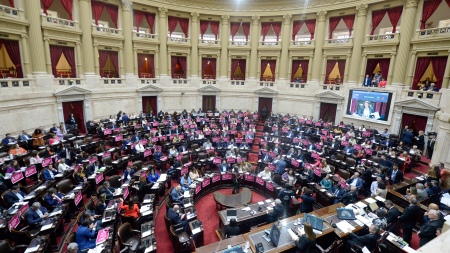Authorities from the Financial Information Unit (UIF), the AFIP, the Ministry of Economy and the Central Bank asked Congress to move forward with the bill to reform the law for the prevention and prosecution of money laundering and the financing of terrorism.
The officials expressed their request in an informative plenary session of the General Legislation and Finance commissionschaired by the pro-government members Lucas Godoy and Alicia Aparicio.
The project seeks to grant greater functional, administrative, economic and financial autonomy and autarky to the FIUand among other issues, it also establishes that operations of virtual assets, including cryptocurrencies, must be reported to the agency.
The sanction of this initiative is key for the National Government since next year there is a new technical review of the International Financial Action Task Force (GAFI) and Argentina must update its legislation to the new regulations of the entity.
The exhibitions in the commissions
The head of the FIU, Juan Carlos Oteropointed out that “this project had a good process, which was participatory, where three central axes stand out: the modifications to the Penal Code, the reform of Law 25,046 and the creation of a registry of virtual assets”.
The official explained that “it is a substantial reform after eleven years” and said that “it is very important because it will improve the fight against asset laundering and the fight against terrorism.”
Otero pointed out that “in September 2023 the country will be evaluated by the Financial Action Group” and both the “public sector in the three powers and the private sector” will be analyzed, and recalled that in 2012 he added new recommendations and incorporated ” the effectiveness”.
The official also said that “it is important to approve this bill to be effective in terms of evaluation” and recalled that “they evaluate a country and not a government.”
He also explained that the bill has three central axes: the reform of the Penal Code, the changes to Law 25246 and the creation of a registry of beneficiaries.
On the Criminal Code two verbs are incorporated, possess and acquire, based on the FATF recommendation, and with respect to the amount of 300 thousand pesos it was decided to “modify it due to the causes that are in process.”
Regarding the modification of the law, “virtual assets, providers of virtual assets, and clients, beneficiaries” are incorporated, and regarding the FIU, “functional, administrative, and economic autarky is incorporated, since the financial one already existed.”
For his part, the director of the Central Bank, zenon biagoschsaid that “after the pandemic, the financial service offer mechanisms have mutated and are different; therefore, the controls that must be applied in this sense have to be updated in some way to this new reality.”
Veronica GrondonaDirector of International Taxation of the AFIP, pointed out that “the identification of the final beneficiaries, both based on ownership and other control channels, allows for a synergistic and unique vision of the problem for all organizations. Registration is necessary ”.
Meanwhile, the president of the Securities Commission, Sebastián Negri, said that “the model contemplates the concern related to money laundering, and this includes issues related to the traceability of operations and the regulation of thresholds. Work should also be done on the crisis of confidence.
Meanwhile, the head of the Argentine Federation of Bar Associations, Fernando Diaz Cantonsaid that “this project intends to include lawyers as obligated subjects to report suspicious transactions, thus undermining the relationship of trust that must exist with the client.”
The president of the Buenos Aires bar association and former minister Ricardo Gil Lavedra also rejected the inclusion as obligated subjects to inform lawyers, who pointed out that “it is very important that the criminal prevention and prosecution bodies can effectively carry out their task; in this case , the FIU”.
The former Vice President of the FIU, Maria Eugenia Talericostated that “the opportunity would be lost if the penalty threshold of 300,000 pesos is not raised. Today the money laundering maneuvers of organized crime affect the economic and financial order. The increase will allow criminal cases to be purged.”
The lawyer Gustavo Juana pointed out that “the FATF published, in 2021, a document recommending the regulation of all activities related to virtual assets; it is estimated that in Argentina there are 2.4 million people who have crypto assets.”
The project contemplates various reforms, but one of the most important is that it converts the FIU into a decentralized body of the National Public Administration, under the jurisdiction of the Ministry of Economy, with its own legal status, which will function with autonomy and functional, administrative, autarky. economic and financial.
Another important point is that the number of operations that must be reported to the FIU is expanded and, in this sense, the incorporation of virtual asset service providers is provided, to natural or legal persons who carry out custody on behalf of a third party. and cash or liquid securities management, attorneys, and trust and company service providers.
In the fundamentals it is stated that “virtual service providers are added to the plexus of subjects in line with the risks represented by the use of virtual assets, in accordance with the current international standard and the FATF general glossary”
“Indeed, virtual assets represent a business that is expanding throughout the world and have gained enormous economic relevance in recent times, entailing risks for the system of prevention and fight against money laundering, financing of terrorism and proliferation of weapons”, said the Executive.
















